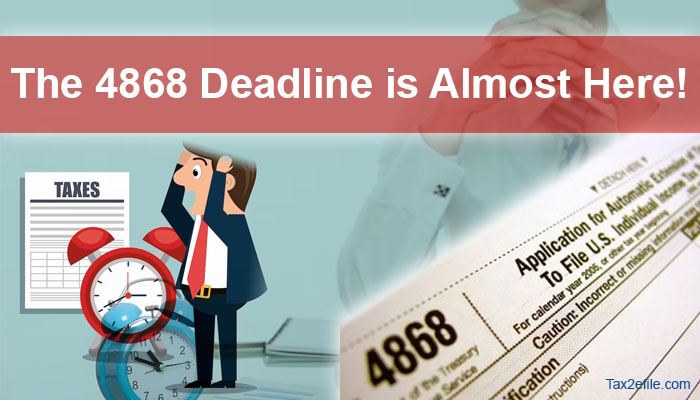- April 18, 2023

Table of Contents
E-file Extension Form 4868
April 15 is the deadline for individual taxpayers to e-file extension Form 4868 with the IRS. This tax Form serves as an extension request for U.S. federal income tax. Filing this Form grants taxpayers additional time of about six months, up to October 15, to file their returns. To be eligible for the extension, individuals must complete and file the Form by April 15. Otherwise, they may face penalties or interest charges if they do not pay what is owed on time. This facility can be available to busy business people, sick individuals, and others who didn’t find enough time to file their returns with the IRS by the original deadline.
Information needs to Tax Payers:
Taxpayers need to understand that requesting an extension doesn’t alter the deadline for paying taxes. Therefore, they must ensure that any due payments are made on or before April 15. It is also crucial to note that extensions only permit extra time to submit tax returns and don’t apply to paying tax dues. Thus, taxpayers are advised to predict their tax liability and settle as much as they can ahead of time to evade late payment fines. Lastly, taxpayers must remember to attach all payment forms or vouchers with their request for an extension to prevent any issues or setbacks with the IRS.
The deadline for e-filing the tax extension for 2023:
The deadline for e-filing the 4868 tax extension form is April 15 of the tax year. As this falls on a weekend this year, the deadline has been extended to April 18, 2023. Filing this tax extension Form will fetch time up to October 16, 2023, to file the returns. Before filing the tax extension Form, taxpayers should calculate the taxes they owe the IRS and pay them within the deadline to avoid late fines and penalties. Taxpayers also have the option to amend their tax return for a period of up to three years from the original filing deadline, to claim tax refunds.
After the April 18th, 2023 deadline, the IRS will stop accepting the extension Forms, and thus it is mandatory to file them on time to avoid penalties. Even if the taxpayer doesn’t have the money to pay the taxes they owe, they should e-file their tax return or their tax extension. The IRS penalties and fees for not e-filing a tax return are generally larger than the penalties and the fees for not paying the taxes on time.
E-file 4868 form with Tax2efile IRS Authorized Tax Preparer:
The following information and details are required to e-file extension form 4868:
- The taxpayer’s SSN,
- Address and name,
- An estimate of the tax amount owed,
- Any payments already made,
- Whether it is an automatic or additional extension being requested,
- The chosen payment method (credit card, money order, or check), and
- Finally signature along with the date.
Bottom Line:
Taxpayers must file federal income tax returns for tax Forms 1040, 1040A, or 1040EZ by April 15. If taxpayers cannot find time to file the Form, they can muse. They should, however, calculate their tax liability and pay the tax amount due. They can take help from experts on tax2efile to help them with any of the steps in this process.


